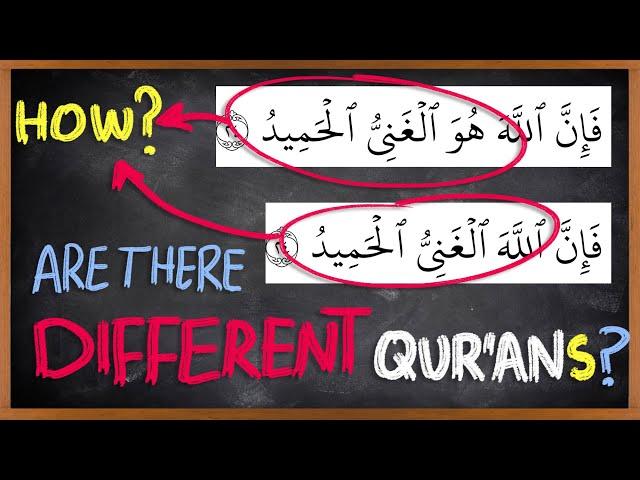
The SEVEN Ahrof & the TEN Qira'aat of Quran - EXPLAINED! - Arabic101
Комментарии:

Very helpful video
Jazak Allah khair
Today in Taraweeh the Imam used a different method of qirat, he explained this before start of congegration but it was in Arabic. I couldn't understand. This made me search different types of Qirat of holy Quran and I found this video Al hamdulillah

I have a question - Uthman RA already destroyed the 6 harfs and 1 harf (Quraysh) was preserved then how come we still have the variations? Please answer. I am interested to learn. Thanks.
Ответить
great videos
Ответить
GHALEES ALL OF U KHABISSSULLLL KHABASATTTTTTTTTTYTT😂
Ответить
I really appreciate it ❤
Ответить
سلام عليكم ورحمة الله وبركاته ، akhi I benefit from your videos a lot and I want to advice you, I understand you might need the money and assistance , but please try to turn off the ads, for the sake of Allah Akhi not for our sake. Sometimes ads come that are inappropriate or show uncovered women, try to regulate these for the sake of Allah Akhi may Allah bless you
Ответить
Ma Sha Allah
Ответить
Islam hatters gonna hate this. nice explanation, thankyou
Ответить
The poster is no longer available. Re-upload please?
Ответить
I have one question. If Hz. Uthman (ra) transmitted one version of Qur'an, why do these hafs and warsh variant exist? Should there be just one variant?
Ответить
right today i got confused by this new concept. and right now i got clarification via this video. that God for not letting me Go
Astray.

Amazing video
Ответить
you said something abou turkish dialect but in turkey we do not speak arabic but turkish i just wanted to confirm this beacause it could be misunderstood by others
Ответить
The quran HAS multiple variations, and IS NOT 100% conserved. There are 4 dialects that it is available in the world today, most commonly in the west is Hafs, then Warsh, Al-Dori, and Qaloon. Here are some examples of how they differ in MEANING, not just in annunciation: q3:146 in Hafs uses "qatal" meaning 'fought,' Warsh uses "qutil" meaning 'were killed.' It's an important distinction in ali 'imran because it's reprimanding the followers of Muhammad for not being like previous disciples of prophets. It implies that the speaker in this case, 'allah,’ is either stressing the importance of active engagement in a struggle, or the actual sacrifice of life, a praise of martyrdom. q2:125 in Hafs its lile "watakhlzu" (You shall take), in Warsh it's "watakhAzu" (They have taken/made). The subject is "Maqam Ibrahim". One version is the action of giving an order, while the other states a historical fact/observation.
Ответить
// .. Bottomline, why is that crap written in a language that even the natives can't understand, let alone other cultures and languages? So, to remedy the problem, attack, capture, subjugate, rape and murder those who have no interest in this manmade rubbish in the name of allah (1400 years of it).
Yeh, ..very impressive.

Lol different words to say same thing😂
Ответить
Masya Allah this is really new knowledge for me🥹 thank you very much
Ответить
Actually, more and more english speaker affecting and creating new dialect, since in english written and spoken language is different/inconsistent. Even in your lectures, which supposedly aimed to english speakers, you pronounced QUR'AAN as QUR'EHN, AYAH as EYEH, MELIKI YAUMIDDIN etc. it's unavoidable. 😂
Ответить
Please anyone answer If seven ahrof of the Quran? Why did Uttman burn all manuscripts but leave only quran rewritten by his commission? He did not know this hadith ?
Ответить
So basically you guys admit there are some variations on Quran. It is an error on Quran who majority muslims claimed that Quran is ONE and no one can create a new verse out of it. Even allah challenged and here we go that Muslims have more than 1 different variations and also in this video clearly mentioned that there are different meanings.
Ответить
V
Ответить
Jazakalahu khairan
Ответить
All sources in arabic language :( come on! Make it easy. Where is the english version guys?
Ответить
Back in my hometown we pronounce ض as la ط is thve ظ is le ث as thaa . But came to know different pronounciation and my pronounciation is wrong. Was confused and now i am cleared
Ответить
They are all as bad as one another 😂 fake and evil
Ответить
There is no Turkish Arabic dialect
Ответить
Damn, without those crossdressing enemies if Islam saying that there are different versions of Quran, I never would've learned that the Quran was revealed in 7 dialects, damn this was dangerous, we seek out more knowledge of our deen by ourselves instead of a reaction to what the enemies of Islam tells us
Ответить
Why am I finding this out at 40 I don’t know what to say
Ответить
I’m more confused than ever.
Ответить
Christian Prince laugh out loud 🤣🤣🤣🤣
Ответить
Assalamualaikum 'Arabic 101' Your videos are very important for learning about the Quran. But there is one problem, those who do not know English have to face problems. We Bengalis do not know much about the Quran. So, I have a special request to you, please provide the videos in Bengali as well.
Ответить
JazakAllah khair, may Allah reward you for your efforts!!
Ответить
Non Muslims try a use this to say quran is corrupt 😂
Ответить
Brother which tajweed rules of which qira’a do you teach?
Ответить
so basically all variants are valid, preserved and given by the prophet pbuh. the differences are mostly linguistic, at most adding information while never raising contradictions.
Ответить
Letter for letter, dot for dot does not sell anymore.
Ответить
What should I do first should I learn Arabic or learn the Quran?
Ответить
Merci !
Ответить
Come one man
Are you telling me that Allah spoke to the prophet in 7 differnt way.
For instance when allah say water, he will say it in 7 different way.
Im muslim but i dont buy this myself.
If you tell me that because of the different dialect it haooens that ut was read differently like water in british or warer (water) in american english.
But to say it was revealed in 7 different dialect is not correct

Hold up, so Allah supposedly revealed the quran in 7 different versions to make it "easier for different arab regions to read and understand the quran". But then why didn't he make different translations of the quran for people who don't speak arabic?
Ответить
Dr Jay smith's work is more in-depth.and Dr Daniel Brubacker's Textual criticism,is a deep dive.
Ответить
Very good
Ответить
Amazing❤❤❤
Ответить
Why Some Words in the Quran are Spelled Differently
About one hundred unique words in the مُصْحَف (written Quran) are written differently than what the normal rules of Arabic script writing dictate. Here are three possible reasons why.
1. To prevent misreading or confusion. This is so because, back in the day, when they first wrote down the Quran, there were no dots or diacritical markings as we know today. As such, they had to come up with creative ways to make sure a word is not misread or confused with another word, especially for non-Arabs. Here are a couple of examples:
Example 1: The word مِائَة (which means hundred) is written with an extra alif. This silent alif is not a part of the word. But without it, the word could be mistaken for مِنْهُ, فيهِ, or فِئَة if you remove all dots and markings. (Note: Outside of the مُصْحَف, you don’t have to do it. You just write it normally (مِئَةٌ) because the dots and markings prevent misreading or confusion.)
Example 2: The word أُوْلَـٰٓئِكَ is written with a silent waw (و) to differentiate it from إِلَیۡكَ. It’s not a part of the word. It also indicates that the preceding harakah is a dammah.
2. To accommodate variant recitations (الْقِراءات) so you can read it in multiple ways, depending on which reading you follow. For example:
مَـلِكِ یَوۡمِ ٱلدِّینِ (قِراءَةُ نافِعٍ) ،
مَـٰلِكِ یَوۡمِ ٱلدِّینِ (قراءة عاصِمٍ)
3. Sometimes, it’s as if Allah سبحانه تعالى wants us to figure it out. For some words, some of our great scholars have already figured it out, while others remain a mystery. For example, sometimes the word رَحْمَة is written normally and sometimes it’s written like this: رَحْمَت So what’s the secret? Arabic books like “The Secrets of Quranic Script” by Muhammad al-Bakri attempt to uncover the mysteries. He goes over about one hundred words and possible wisdoms behind why they’re written differently.
Many of these differently spelled words occur repeatedly in the Quran. The exact total number of such words is hard to know, but my best guess is that it’s a small percent (probably 3% or less). And the total number of words in the Quran, per one estimate, is 77,277.
Lastly, the above three reasons are the most common reasons. Sometimes, we just don’t know. The Quran’s script writing (الرَّسْمُ الْعُثْمانِيّ) is tawqeefi (تَوْقِيقِيّ), meaning that we follow it whether we can guess a reason for it or not. It’s frozen and cannot be changed. Ever.

Salam. Are there examples where the very word (so based on its trilateral roots) and the meaning are different?
Ответить





![[VLOG] Taiwan trip 2편 | 한갱 설레는 교복핏지우펀(Jiufen)️관광(with.윤개굴이) [VLOG] Taiwan trip 2편 | 한갱 설레는 교복핏지우펀(Jiufen)️관광(with.윤개굴이)](https://smotrel.cc/img/upload/b0hNNWUxS09hek4.jpg)



















